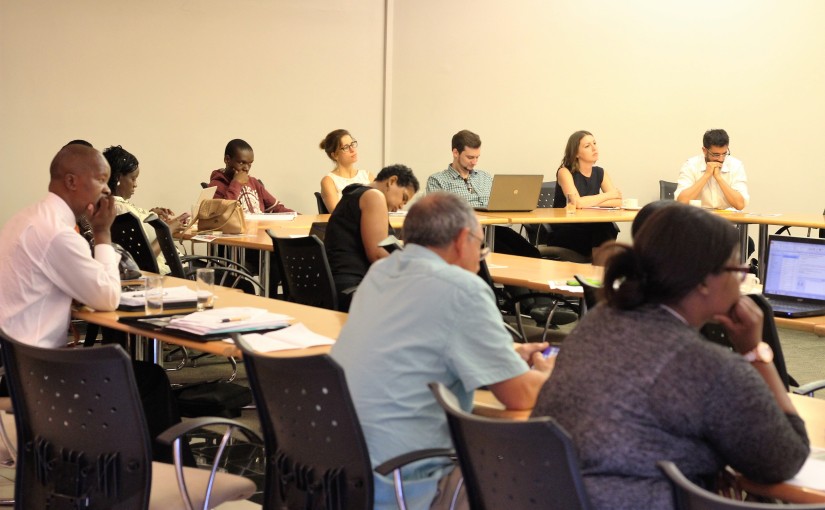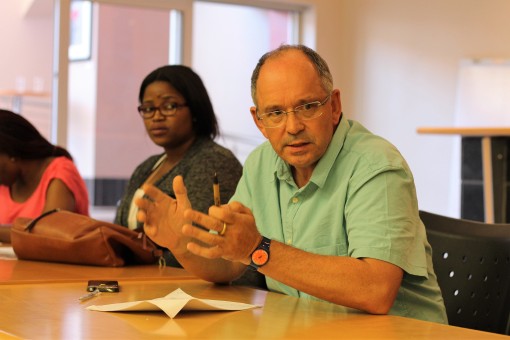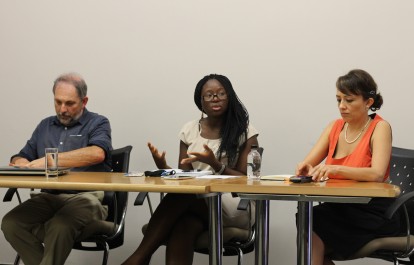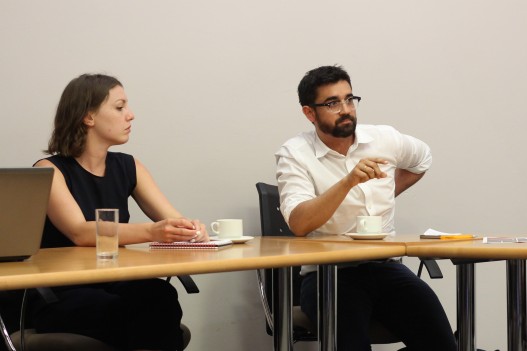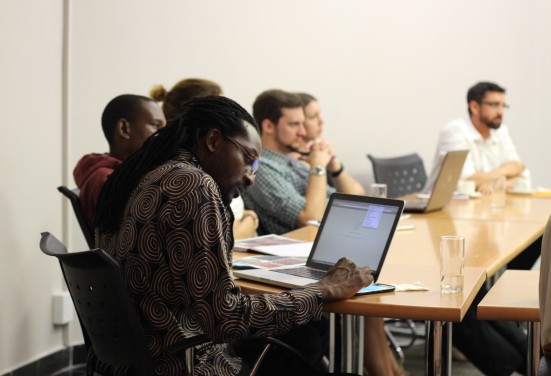On the 6 April 2016, the Legal Resources Centre (LRC) held a side event at the 58th session of the African Commission on Human and Peoples’ Rights in Banjul, The Gambia. The side event discussed the United Nations proposed treaty on transnational corporations and other business enterprises with respect to human rights.
The side event attracted participants from various organisations across Africa. Our panel consisted of three staff members of the LRC and a member of the African Commission’s Working Group on Extractive Industries, Clement Voule. Unfortunately, Nomonde Nyembe from the Centre for Applied Legal Studies was unable to join us as a panellist due to an unanticipated injury.
LRC researcher, Mabatho Molokomme, facilitated the session. She gave a brief background on the Human Rights Council resolution and what it envisages for the treaty. This was followed by a summary of the first open-ended intergovernmental working group (IGWG) session that took place in Geneva, Switzerland in July 2015.

Drafting the binding treaty
LRC attorney, Sayi Nindi, spoke about community participation and the drafting process of the binding treaty. Some of the key points she raised are as follows:
- The drafting process of the binding treaty is at its preliminary stage and no one knows how the treaty will look like.
- The following still need to be determined, amongst other questions: what rights will be covered by the treaty; what companies the treaty should apply to; if the treaty should define in greater detail the content of states’ duties to protect human rights and ensuring access to justice for the affected people.
- There are different views on whether corporations should be subjected to international law. Positivists say corporations should not be subjects of international law because no international law instrument recognises them as such. Other flexible interpretations say that corporations may have limited international legal personality. Pragmatists are of the view that the issue of whether corporations are subject to international law (and what legal responsibility can be imposed on them) is irrelevant as clearly corporations have both rights and responsibilities.
- The development of this treaty has to be people- and community-centred. Local communities must be empowered to lead and participate in this process. They must bring their experiences to the table.
- Communities have to bear the brunt of the so-called “development” that allegedly comes with transnational corporations.
- There’s a clear gap in the international human rights law framework in its failure to address human right abuses by transnational corporations. They can now participate in debates and resolutions. This is the perfect opportunity to state the importance of Free, Prior and Informed Consent (FPIC)* and insist on it to be a requirement for developmental projects.
- African civil societies should lobby their governments to participate and contribute at the IGWG sessions.
Cases that the LRC are litigating were used to illustrate how the treaty would be beneficial in situations where individuals or communities are victims of human right violations by multinational corporations. There are many examples on the continent where victims of human rights violations perpetuated by multinational corporations are left with no recourse if they solely relied on their domestic laws, which may not be as effective as an international instrument such as the binding treaty.
The LRC have been working with the South African government and we were encouraged that other civil society organisations do the same. The participants were informed of ways in which they can engage with their governments in order to promote the treaty movement at the UN level. A draft letter to be sent to governments was offered to those in attendance.
Right to Development
LRC attorney, Wilmien Wicomb, spoke on Right to Development as enshrined in the African Charter on Human and Peoples’ Rights and Free, Prior and Informed Consent. She raised the following key points:
- The question is sometimes raised why we need yet another treaty with so many existing international and soft law instruments. It was noted that the treaty represents an acknowledgement that transnational corporations have become powerful enough as players in international relations and domestically to perform governmental functions; such as delivery of services and contributing to policy and development decisions. As such, the treaty represents a radical departure from existing international human rights law.
- If that is the case, a key question that continues to be debated is whether transnational corporations should also be the bearer of international human right’s duties?
- To answer this and other difficult questions, it is important to look at the current context. The current resource wave is targeting mainly rural communities – the poorest and furthest away from basic services – in South-South countries: in part because of their insecure and cheap tenure.
- She noted that Africa can bring something different to the transnational corporation discussion. The African context has important differences: a different legal context (from, for example, Latin America with International Labour Organisation 169, FPIC entrenched in domestic law); a different history (in particular to indigenous peoples); old and new mining sectors.
- From our unique legal context, Africa can contribute the African Charter and its Right to Development as a procedural and a substantive right; real choice with an emphasis on outcome and on community-driven development.
- Furthermore, African customary law requires principle of consent, of local decision making, of local living law. Increased recognition of customary law must be utilised to counter common law and business-heavy legal frameworks.
There was a general discussion on why the treaty is not being favoured across the board, given that everyone is aware of human rights violations happening. There was general consensus in the room that the United Nations Guiding Principles on Business and Human Rights (UNGP) are preferred by the home states of the transnational corporations because of their voluntary nature. Much work and negotiation will be required before the treaty can reflect all we hope it will contain.
There was acknowledgement of the high standard of rights as set out in the African Charter. No one will be campaigning for anything less than that standard.

African participation
Clement Voule spoke on civil society advocacy and mobilisation. He emphasised that there has been marginal participation from Africa in the process thus far. He encouraged people to be a bit more proactive in their involvement in the upcoming IGWG session in October 2016. He noted that the content and its negotiations will take a long time. There may not even be a treaty in the end but this should not deter people from joining the process. He also stated that the treaty conversation should not be kept separate from the UNGP conversation. The treaty must be viewed as the next step in the process and not a replacement of the other. States reaching common ground on the UNGP may be a window of opportunity and a better space to discuss the treaty.
Outcomes
The side event induced a worthwhile conversation and we invite the proposals that were put forward. A participant who works for the African Commission proposed that they could assist us to host a panel discussion at the next African Commission session in November 2016 in order to reach a broader audience. We also made contact with one of the Commissioner’s working with the Working Group on Extractive Industries, who is interested in participating – through the working group – in the work of the binding treaty. The participants at the side event also suggested that this conversation be opened at the African Union Summit.
By: Mabatho Molokomme, Sayi Nindi, and Wilmien Wicom
*Read more about the FPIC principle here: https://za.boell.org/sites/default/files/perspectives_april_2016_web.pdf
**Read more about the treaty debate here: https://realisingrights.wordpress.com/2016/03/31/south-africa-debates-the-merits-of-the-proposed-treaty/
